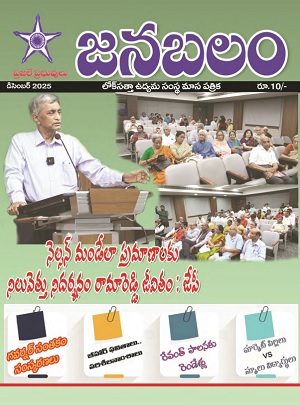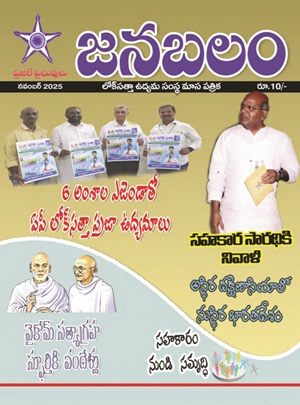"A mere change of the State's name or boundaries or capital will not alter anything unless fundamental governance reforms are ushered in," says the Lok Satta Party in its report to the Justice Srikrishna Committee, which is inquiring into the situation in Andhra Pradesh.
In its 117-page report, the Lok Satta says that "we can decide either way" on Telangana provided all stakeholders are satisfied, national repercussions addressed, and the real solution of district governments is implemented. Strong views are not necessary, as separation is neither a catastrophe, nor a panacea."
Lok Satta Party President Dr. Jayaprakash Narayan released the report at a media conference here today.
The party warns against adopting a casual approach to the demand for Telangana. It points out that Andhra Pradesh is the first non-Hindi state witnessing demands for division despite a common language. "It is important to have a national, tangible, universally acceptable marker to reorganize states. Language has been such a marker so far, and all non-Hindi states are formed on the basis of one language - one state. Now we need to carefully examine other markers before setting out to reorganize our states. Neither history nor geography nor development is sufficient as a marker. Once language ceases to be a marker for state formation, we should decide what a rational criterion for the division of states is. Once these questions are addressed, solutions can be found. Any ad hoc approach in one part of the country will lead to escalating demands and a cascading effect elsewhere. Therefore, a rational and deliberate approach based on consensus and longterm interests is critical."
The Lok Satta recalls that it is for the first time, sections of a region with a large capital city want to separate as a State. "So far, every demand for a new State has been from far-flung areas away from the State capital. Hyderabad is not just another city. It is on par with Chennai and Bengaluru, and with 85 lakh people, accounts for over 25 per cent of the population of Telangana and a disproportionately large share of the economy of the state. Millions from all over the country and the various regions of AP have made it their home. They are emotionally attached to the city, even if their ancestral family roots may be elsewhere. In such a situation, an all-too-casual approach to separate statehood is calamitous."
The Lok Satta traces the present crisis in Andhra Pradesh to "genuine grievances of political disempowerment and a sense of lack of regional autonomy."
The report says, "The local governments in Andhra Pradesh lost dynamism because they did not enjoy functional freedom, suffered from paucity of funds and, and bureaucracy was strengthened at their cost. Despite the passing of the 73rd and the 74th Constitutional amendments, real empowerment of the local governments has not taken place in Andhra Pradesh. A trend of over-centralization of political power coupled with the abolishment of the empowered, constitutional forum of Andhra Pradesh Regional Committee in 1973 has deepened the sense of political disempowerment and political alienation."
The Lok Satta, therefore, recommends that institutional arrangements be made immediately to address the concerns and aspirations of Telangana and other backward regions in Andhra Pradesh. "The arrangements can be taken up complementary to any efforts towards evolving a final settlement of the regional aspirations in Andhra Pradesh."
Dealing with regional disparities in Andhra Pradesh, the report says that backwardness is distributed across all regions. The Lok Satta carefully examined whether there has been any systematic and organized discrimination of any region in Andhra Pradesh since 1956 as also the long-term trends of economic growth, per capita income and social indicators among the various regions and districts of Andhra Pradesh Making a broad assessment of budget allocations, sector-wise and district-wise, the report says that state resources have always been equitably deployed under various schemes. It refers to some of the biggest programmes like the public distribution system, housing for the poor, pensions for the aged, widows, and the disabled, education grants and healthcare programs and says the allocations under them are roughly proportionate to the population.
The report says that there is no evidence of discrimination in the location of power projects. In terms of transmission and distribution infrastructure, the situation is similar across all of Andhra Pradesh. The report points out that there is no real evidence of any deliberate discrimination in distribution of river waters or denial of due share to any region in the State except on grounds of topography and prior use.
The report says there is no organized discrimination between regions in the utilization of funds transferred by the Government of India for national programs like the National Rural Employment Guarantee Scheme.
The Lok Satta proposes the following institutional arrangements pending a final political settlement:
I. The Presidential Order (1975) issued under Article 371D(1) should be immediately amended by deleting Sec. 14(f) thereby bringing even the recruitment of police personnel in the Hyderabad City zone into the overall zonalization/localization framework of the Six Point Formula (SPF).
II. Formation of Regional Councils in AP by restoring Article 371(1): They will function as a valuable, productive, and powerful mode of genuine regional autonomy and political empowerment. An omnibus enabling constitutional provision for the formation of Regional Councils in AP and making institutional arrangements for the devolution of powers and autonomy to regional and local bodies at district and sub-district levels has to be enacted. Re-issuing of the expanded SRO 443-A with suitable amendments should also be accomplished.
III. Establishing elected and fully empowered District Councils and City/Metro governments - mandatory district-wise budgeting - per capita grants directly to local governments - strengthening the third tier of government in the Indian federal structure.
IV. Effective, independent, credible mechanism for overseeing the full and effective implementation of Presidential Order (1975) and the SPF scheme.
V. Establishing the empowered Regional Development Committees (RDCs) having constitutional guarantees: (a) These RDCs will have real authority; a significant and specific share of the State's development budget corresponding to the region would be transferred to each RDC. They will oversee the functioning of local governments and these RDCs will have responsibility to fully and immediately implement the Presidential Order (1975). (b) A strong mechanism of accountability of RDCs to the State Legislature and Executive (i.e. State Government) must be institutionalized.
VI. Resolving inter-regional differences over sharing of river waters and water use, as they figure prominently in the cause of development of Telangana and other backward regions of the State: Given the geographical extent and drainage patterns of the river basins in our State, the Government of India should include the addressing of regional requirements within AP in the terms of reference while establishing the statutory Water Disputes Tribunal(s) for the riparian states of the Krishna and Godavari river basins. The Government of India must constitute an Empowered Expert Committee based mechanism to institutionalize permanent scientific and timely decision-making process on the manner of storage and sharing of river flows in various regions of the State, anticipation, and mitigation of floods.
VII. Central package for boosting economic development along 'growth corridors' in AP: Identify and establish 'rapid growth corridors' covering the backward regions and grant a generous package for AP that would help establish 'education zones', 'agriculture green zones' and 'industrial zones' in these rapid growth corridors of AP.






This comment has been removed by the author.
ReplyDelete